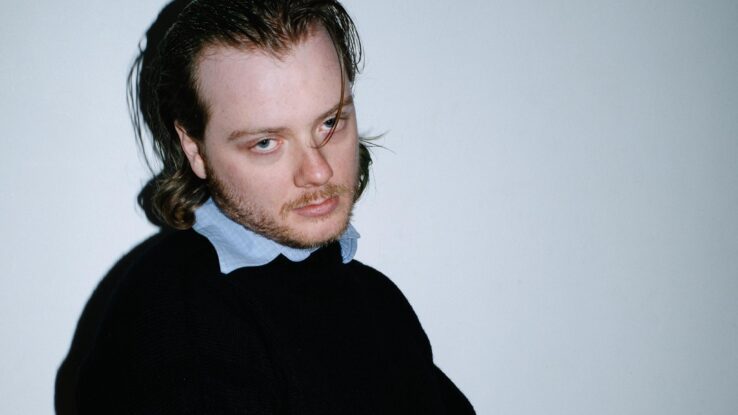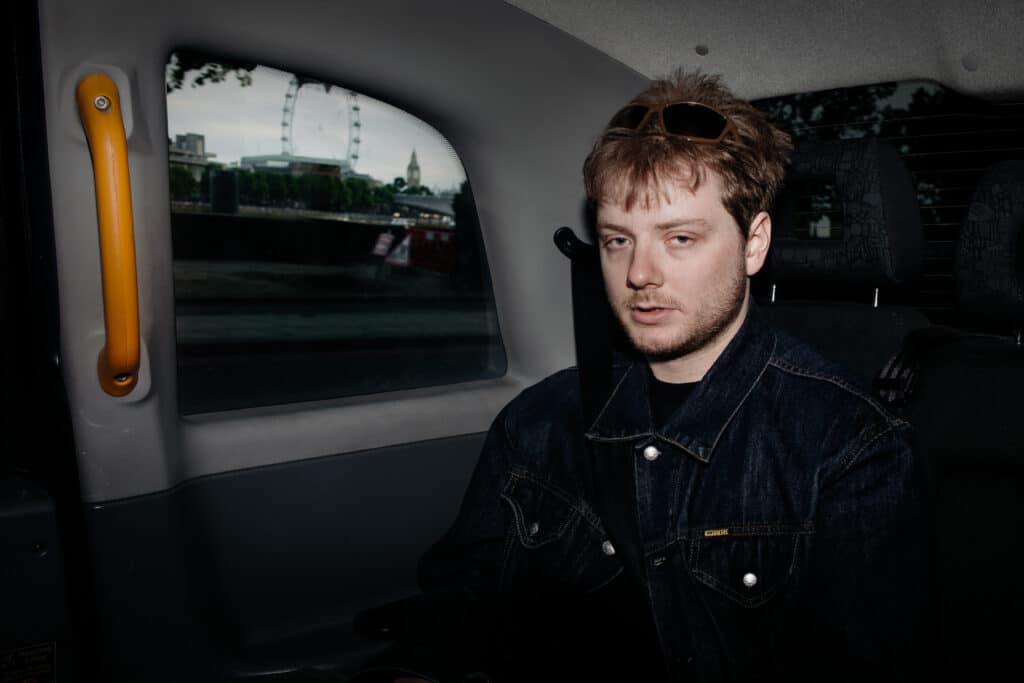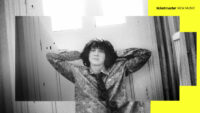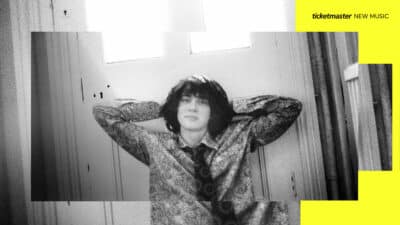Interview

Interview
Famous: “Our music is a space in which you can grapple and sit with complexity”
Jack Merrett on the earnest return of his eclectic post-punk project and debut LP Party Album
There’s always a laugh, in the industry, every time a new band comes along with the least searchable or “SEO-friendly” name. Meet Famous. If you think adding “band” or “album” after their name might help, it doesn’t. What if we told you their debut was called Party Album, and its cover is the just the colour green?
Yes, you’d still probably land on Brat. But Jack Merrett and his South London band are, albeit with a heavy dose of irony, trying to cut through the noise as they reignite the project earnestly with an eclectic and experimental sound that though rooted in the capital’s post-punk sound, drifts wherever Merrett’s whimsey takes him.
In the days after Party Album‘s release and before a small string of UK shows to see out the year, Merrett delves into the making of the debut, that green “cock-up” and the eternal inspiration of The Beatles.
Some may have heard your EP England in 2019 or The Valley two years later, but the hype is back on after the release of your debut, Party Album. Talk me through the journey to get there.
It’s been a meandering process. After we released The Valley we spent a couple of years touring, and we got really lucky with the shows we were playing. We were lucky enough to get booked quite a lot in Europe. And that was a real kind of growing experience for us. I guess, playing more on demand and in new environments, new people, learning a bit about what it takes to connect with audiences who maybe don’t have any context.
So I really enjoyed that, so we belatedly turned to writing new music in early 2022 and that’s when the writing for this began. And the first year was chaos, and then the second year, 2023, was was better. As Famous, I’ve been working with a broad array of people over the years, and it was about, I guess, formulating a group around me who have now become utterly integral to the project, to make the album with and kind of reconceptualise it for a new project. So I guess that’s partly why it took so long. But also, we’d taken a circuitous path to get here anyway, by doing these two long EPs that had some of the feeling of an album about them, I guess, in the sense at least that we tried for them to make them have a sense of narrative and different moods pushing in different directions on them, rather than, you know, maybe an EP, more conventionally, would be a consolidation of sound. We think we were always charting in different directions. Anyway, we wanted to get the album right. Basically, we work really hard.
It seems like a basic question, but let’s talk about the album’s name, Party Album. Even from your band’s name, it feels like you’re not averse to sense of irony. Was that green album cover another ironic nod to ‘Brat Summer’?
We’ll deal with the question of the green in a second, but in short: no, it was
it was basically an unintentional cock-up.
As far as the title is concerned, I think a through-line for the project has always been that even though there’s an ostensible irony to a lot of what we do, the subject matter is often fairly serious, and, sometimes confessional and dealing with, I suppose, darker themes. I’ve always been a believer that you can earn permission to be a little bit serious and high minded or dark, if you tell an audience that you’re okay laughing at yourself. And so I think there’s always a double-edged element to it all. That the name Famous was meant to work on a level as a joke, but it was also poking fun at us for our utterly absurd, grandiose ambitions for the project, and then the kind of insecurity and sense of inadequacy that fuelled that grandiosity. That sort of sounds like a contradiction, but I think that’s what it was. And then so with Party Album, a lot of the songs are about addiction and experiences that I’ve had. That’s quite heavy, basically, and I liked the title because I guess I hope it made clear that all of that was meant with hopefully a lightness and maybe some self-awareness, as well as trying to unpick some potentially quite difficult things.
The concept with the green was, and I’m led to believe that this is kind of a similar idea she had… We made the arguably ill-advised decision after The Valley, well it wasn’t really a decision, but we just happened to leave social media effectively. Our account was still up, but I didn’t put a post for a year and a half. We did whole tours without mentioning it. I’m a bit repulsed by it, as I’m sure a lot of people are. And I don’t like the sense of… I don’t really like bothering people, basically, with crap. Anyway, the thought was that if we could find this very simple, unifying brand identity with a colour, that there would be a way of simplifying it, bringing it to its most essential basics, we’d have a way and a format to announce things. Green, incidentally, was the colour. But the idea of there being a colour was kind of born of that desire just to reduce the sort of nonsense and complexity of social media from myself, basically as the person who ends up doing it. Then coincidentally, the other one ended up being…
… the biggest pop album in years?
Haha yeah, exactly, an enormous cultural moment. We obviously realised quite in advance what a cock-up we’d made, but late and long enough in the process that it wasn’t practical to change it. So we decided to style it out.
I think it was a wise decision, it almost adds to that self-deprecation we just mentioned.
It works on some level, totally, in a kind of tragic and funny way. But it’s been funny seeing people online really confidently asserting that we knew absolutely what we were doing and that this is an incredibly stupid or genius marketing decision. It couldn’t be further from the truth.
I read that you were really inspired by the Peter Jackson Beatles documentary when it came to writing Party Album?
I love The Beatles and they are the reason I make music, so I always come back to them. I’ve got a very circular relationship with their music. When that documentary came out it was amazing, I mean just as a fan, the intimacy with which you could just sit in the room with them and watch them work, and how cleverly it was put together so you could hear everyone talking and how witty they were. I was totally enamoured with the documentary, and sometimes I feel like with writing or making music, there are kind of two parts to it. There’s this part that I’m quite sentimental and traditional about, the craft of being a songwriter, what it takes to write good lyrics, pulling songs together so they can work just on a piano or a guitar. You know, that kind of very odd fashion view. And then there’s this other element where you’re like, Okay, what’s this kind of janky synth line we can put on it, or what are we doing with the production? How does this fit with the contemporary moment?
The second part of it I’ve always had a much more ambivalent relationship with, I’m never entirely sure what I’m doing there. And so I think watching the documentary and seeing in essence, the people, in my view at least, the best to ever do it in terms of just that craft of writing songs, it really reignited a love for that tradition of songwriting in me and made me want to make something that was closer to that. A little bit more songwriterly, I guess, would be one way of putting it. Over the process we got a bit in our own heads and started making weird noises and probably got got further and further away from that original impulse to make something quite simple and organic. But I think the two impulses are there.
Talk to me a bit about the arc of the album… it quickly rises with a sense of chaos, and then around the mid-point, around ‘It Goes On Forever’, it’s like there’s a send of relief beginning to steadily creep in.
I think to a fault our music is all about culmination and building to the extent that when we were looking at the master or the mixes, you could see all of them were shaped like a kind of a cone that just gets bigger. That’s just what I like. I love that feeling of drama and tension in a song that’s all motion, it’s all building. I don’t think there was anything particularly high minded or conceptual about the track order itself, other than a feeling that we wanted it to have a feeling of culmination and like a crescendo building through it to this catharsis at the end. It’s kind of the only speed I have as a songwriter.
Especially with ‘Love Will Find A Way’ at the end… through some of the sonic features and mainly in the lyrical imagery, it feels like the album flips between a sense of dreams and nightmares, but that closing song soothes in a way.
I’d never made an album before, but for so long and for so much of the time that I was intensely thinking about the album, it was a series of songs that I was desperately trying to think of what order they go in. So the order that they arrived at is not definitive to me. Whereas if it’s there presented to you in that order, when you listen to it like that feels very intentional and you read into it. So I feel in lots of ways, I’m the wrong person to ask about what effect the order has, because I’ve just been on a journey with it, in trying to fit it together. Perhaps there’s some logic to it, that I wasn’t entirely conscious of.
Would it be fair to say the song ‘2004’ is the connecting thread throughout Famous’ progress so far?
I think that’s a really nice way of putting it, because actually there are elements from the original recording that just were plopped straight onto it, and there’s contribution from my dear friend and former band member, Jerskin Fendrix, so it’s really nice to have almost those kind of ghosts of former iterations of the band reflected, so I guess it’s a bit of a tribute to them. I think lyrically quite a lot of the album is about trying to make sense of getting better. I’m… doing well in lots of ways, which wasn’t always true. And ‘2004’ embodies for me the kind of the crazed nadir; if we’re mapping progress from something to getting better, ‘2004’ feels straight out of the before time. So it was nice to have it there, it was almost like, as you say, completing the circle in some ways.

Party Album took me a few listens to grasp, whatever that means. Do you think making it, finishing it, helped your own grasp of Famous’ identity and what you want to achieve from it?
Yeah, I think it has. I think that for me and perhaps generally our music, whatever, is a space in which you can grapple with complexity and sit in complexity in a way that’s hard to do in in other parts of life. Whether it’s a strength in musical terms, I really don’t know, but making the album made me realise that what I love about the project is its capacity to be so many different things, and within that be a space in which life’s complexity can be worked out – at least for me, and perhaps for for anyone who’s who’s kind enough to listen along.
Lastly and bit more lightheartedly I guess, you’re ending the year with a spot at Left of the Dial festival and a small run of UK shows – what are you looking forward to for 2025?
We’re in a space now where, very uncharacteristically for us as a band, over the long view we’ve got a firm line up, great musicians, people I really like and respect, and we’re excited and really proactively making new music. I think I’ve learned a lot from this period of inactivity, between The Valley and Party Album. I really look forward to being more playful and just quicker in getting our getting what we make out there. So I think in 2025 there’ll be lots to come. I’m really excited to get on the road and go back to Europe. It’s a very happy place for us as a band.
Famous will play YES Manchester on 3 December. Find tickets here










